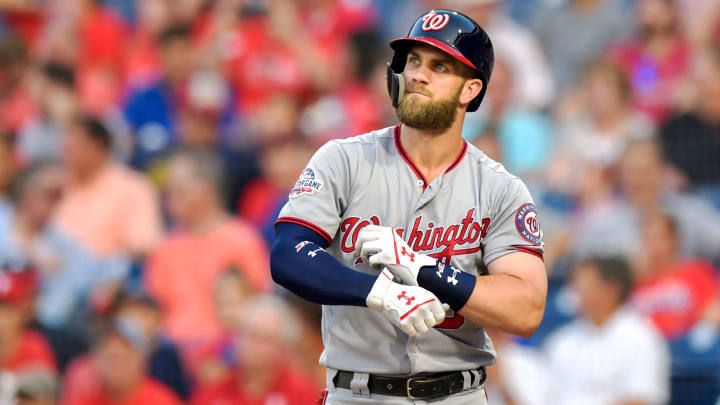Bryce Harper's Contract With the Phillies Probably Isn't What He Expected From Free Agency

Scott Boras’s playbook has worked extremely well for many years. Well, so did the wishbone offense and balata golf balls. Times change. Boras and Bryce Harper approached Harper’s free agency like it was 2009, instead of 2019, and it’s fair to wonder if it went the way they really wanted.
Harper will reportedly sign a 13-year, $330-million deal with the Philadelphia Phillies. This is, of course, a comical amount of money to play in an incredible, sports-crazed city. But last fall, Harper rejected a 10-year, $300 million offer from the Nationals, the team that has employed him for his entire professional career. He turned it down because he (and Boras) were trying to break records. In the end, that’s all they really did: the $330 million is a record total, but ultimately it’s a meaningless one.
Manny Machado got a higher annual average salary than Harper. Mike Trout can break Harper’s record total whenever he feels like it. In five years, nobody will remember or care that Harper set this record. They might not care in five months.
We don’t know the exact structure of the Nats’ offer. There was speculation that Harper turned down the Nats because he wanted opt-outs in his contract. But he didn’t get those with Philadelphia, and now we’re hearing that he didn’t want opt-outs, because he wanted stability. Well, what offers more stability: staying where you have been for your whole career, or jumping to a division rival?
Maybe Harper always wanted to be in Philadelphia, but why? (And I love Philadelphia.) The Phillies are not a better team now. They are not going to make him a bigger star. Their fans will not forgive a bad season or early slump because, unlike Nats fans, they have no fond memories of his 2015 MVP season.
Could this all work out? Of course. Harper is the rare talent who might exceed a huge contract, because he is young and capable of a few insane seasons. This is not Alex Rodriguez to the Rangers, a crazy contract that the team was destined to regret. The Phillies could be the best and biggest-spending team in the division during this run. People focusing on what kind of player Harper will be in 13 years do not understand baseball contracts. Harper does not have to be great for 13 years for the Phillies to be happy.
And at some point, Philadelphia will even feel like home.
And yet: go back to the end of the regular season. Use common sense. From every indication—from interviews to how he embraced the Home Run Derby in D.C.—Harper enjoyed Washington. He did not seem to want to leave, as much as he wanted to hit free agency and set the records that he and Boras have been apparently eyeing for years. You know: $400 million from the Yankees or Cubs or Dodgers.
He was not gunning for a sliver more, and at a lower annual rate, in Philadelphia.
Should Harper have accepted Washington’s offer? We can’t say that, especially without knowing every detail of it. But he could have used it as a starting point in negotiations: Demand a full no-trade clause, offer to give up any opt-outs (which he ended up doing anyway), try to squeeze out a few more dollars. Instead, both the Nats and Harper proceeded as though they knew he would get a much bigger deal elsewhere.
If Harper had worked out a deal with the Nats, he would be in their camp now, and he would probably be happier. He would definitely have comfort, familiarity and built-in goodwill on his side—qualities that matter in-season but are often forgotten during free agency.
Boras works for Harper, not the other way around. But again, use common sense. Together, they apparently misjudged the market. The Yankees were never interested. The Red Sox didn’t try. The Cubs spent the winter explaining why they were already spending enough, so please leave them alone. The White Sox and Padres preferred Manny Machado. The Giants tried, though it’s unclear how hard. The Dodgers came in late, but from all reports, they stuck to their no-monster deals edict, offering a short deal at a high average number. The Dodgers were doing what once seemed unthinkable: trying to sign Bryce Harper for a bargain.
There were reports all winter that Harper did not want to be in Philadelphia. We may never know if those were accurate. (It is possible they are. It’s also possible that Boras wanted that perception out there so the Phillies, whose owner said he might spend “stupid money” this winter, would have to outbid everybody to sign Harper.) But it seems unlikely that Philadelphia was Harper’s first choice all along.
Boras has masterfully played the free-agent game for many years. He stays patient, shows incredible guts, ingratiates himself and manipulates the media with leaks of a record offer from a mystery team on Mars that includes free use of a spaceship. But the market has changed. Big-market general managers Andrew Friedman, Theo Epstein and Brian Cashman have taken control of their organizations and instilled financial discipline. More importantly, Harper was not the enticing, once-in-a-lifetime free agent that Boras claimed he was. Even at 26, even on a Hall of Fame pace, Bryce Harper was resistible.
And so “Harper’s bazaar,” as Boras called it, has closed. Harper can say he set a record, though whatever joy he gets from that will be fleeting. He goes to a great city, for a ton of money, and he has long-term stability. This may all work out for the best. But it’s hard to believe that this is what Harper expected.
